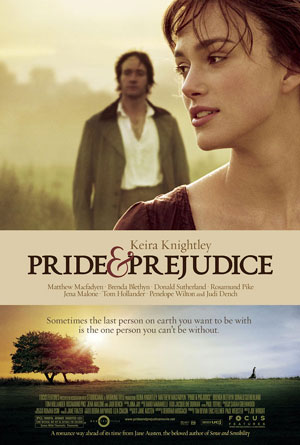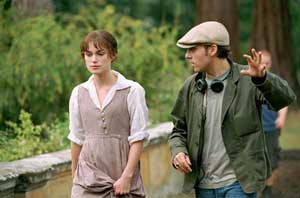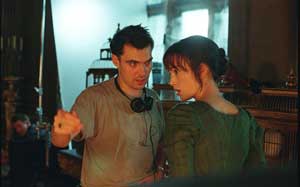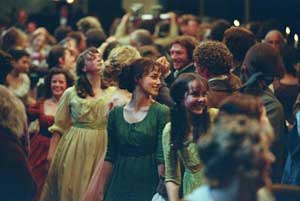 I don’t know what I expected when the director of the new version of Pride & Prejudice walked into the room, but Joe Wright was not it. He was so young, first of all. And he was so grungy. He didn’t seem like the kind of guy who would be drawn to romantic costume dramas.
I don’t know what I expected when the director of the new version of Pride & Prejudice walked into the room, but Joe Wright was not it. He was so young, first of all. And he was so grungy. He didn’t seem like the kind of guy who would be drawn to romantic costume dramas.
It turns out that he’s not, and maybe that’s why his version of the classic Jane Austen novel is so great. He’s created a modern take on the material while not actually modernizing anything within it – it’s all about his attitude.
Pride & Prejudice opens this weekend in the top 30 markets.
Q: How did you come to direct this film?
Wright: I was sent the script and thought I probably wasn’t going to like it, actually. I took it to the pub one Sunday afternoon, and as I sat there reading it I began to cry and laugh out loud. Which was quite embarrassing in the pub. I was very moved by it. I thought this was surprising, so I went and got the book and read it and was bowled over by it.
It was quite a shock. But I take on jobs to learn something. I never have an idea of something I want to teach, I think of something I want to learn. I had a very bad education, unfortunately, and didn’t learn much English literature. So I was interested to learn a bit.
Q: What did you learn?
Wright: At my school? I learned how to duck.
Q: Well, I meant from the movie.
Wright: From doing the movie I learned about Jane Austen and the birth of the English novel. I learned about late 18th century and early 19th century history and the social change that England was going through. The influence the French Revolution had on the English society and aristocracy, and the beginning of the assimilation that the fear of the Revolution created – that’s why Darcy could go to these dances. I learned that women, when they went to a ball, because there was no sanitation in these house, would take diuretics all day to clog themselves up so they wouldn’t have to go to the toilet. I learned many wonderful things.
Q: Diuretics make you go.
Wright: Right, they took them all day so they wouldn’t have to.
 Q: You didn’t put that in the movie.
Q: You didn’t put that in the movie.
Wright: I tried to!
Q: Jane Austen fans are possibly frightening in how into Jane Austen and her works they are. Are you concerned as to how they’ll react to this film?
Wright: I’m glad to say that the fans in England have reacted incredibly positively. That’s a relief. But yeah, I think it could have been very dangerous to take into account too much the great weight of responsibility that doing such a beloved novel puts on one. So I really thought about Jane Austen as this young, 21 year old girl as she was when she wrote the first draft, and thought of her as a character rather than the Jane Austen society and everything that has come after – that whole sort of franchise.
Q: What did Working Title see in you when they approached you for the film?
Wright: I don’t know. I think they might have seen someone who was naïve enough to not really consider the heritage of Jane Austen.
I went for an interview, and they said, ‘How do you see the making of this film?’ and I said, ‘The most important thing about making Pride & Prejudice is that you cast actors who are the right ages.’ The story, to me, doesn’t make sense unless Elizabeth is 20 and Darcy is 28. It’s about very young people experiencing these emotions for the first time. It’s about people who don’t understand the emotions that they’re experiencing. If you were to cast older people – as in the last film version that was in 1940, the Laurence Olivier and Greer Garson version – I just don’t believe that those people are virgins, basically.
That was, I think, my most important decision and choice, and they seemed to like that one.
Q: The decision about a slightly different ending for North America – where did that come from?
Wright: I prefer the English version, actually. I recently met a guy who makes champagne, and he told me that the champagne they make for America has 20 grams more sugar in it than the champagne they market in Europe. I guess Americans like more sugar in their champagne.
Q: Is it true that there’s an internet campaign to get the American ending released in the UK?
Wright: I’ve heard. They’ll have to buy the DVD.
Q: Were there any alterations you made to the screenplay when you shot it?
Wright: I worked very closely with the writer for months. I tried to put everything in the screenplay so that everyone knows what they’re getting into and there are no suprises. But filmmaking is a process of discovery. You always try to respond to what is in front of you as it’s happening. That’s part of the fun of it. There are things like Mr. Collins’ gag about intercourse in church, it was something we came up with on the day and it was wholly inappropriate and Austen would never have written it, but I thought it was funny. There are things that we mucked about, and we improvised ideas.
Q: This is not a well groomed, Masterpiece Theater look. It’s a bit more true to the time.
Wright: I wanted to be as accurate as possible. I felt from my research people did only bathe once a week if they were living in very rich circumstances. I wanted to create a very close proximity to landscape and nature. I had the idea that if you made it very earthbound, if you made Elizabeth’s surroundings very earthbound, then her aspirations for romantic love would be all the more heroic. If she’s got her feet in the mud then the reaching for the stars would be more heroic.
Q: The opening shot of the Bennett household reveals it to be quite a mess.
Wright: I’ve got a friend who’s got four daughters, and my God they create a lot of a mess. Also, the Bennetts, in a house that size if they were wealthy enough they would have had ten servants. Unfortunately they’re not wealthy enough, so they’ve only got two. And so that’s why the place is in such a mess. We were trying to show the economic situation through their surroundings.
Also, the Bennetts, in a house that size if they were wealthy enough they would have had ten servants. Unfortunately they’re not wealthy enough, so they’ve only got two. And so that’s why the place is in such a mess. We were trying to show the economic situation through their surroundings.
Q: Can you talk about casting Mr. Darcy? He’s so iconic that getting the right guy in that role can be hard.
Wright: Matthew MacFadyen’s someone who I’ve been watching for a long time. I love his work on television and in the theater, and I think he’s one of the best actors, if not the best actor, of his generation in England. He, I knew, would come to the role as an actor would in the theater, as a serious actor. He’s not interested in vanity. He’s not interested in playing an icon, he’s interested in playing a character, and I think that’s what Darcy has to be. I was interested in who Darcy was, and what made him that way. I always wanted a proper manly man. I didn’t want a young, pretty boy, boy band kind of character. I think Elizabeth is going through a stage in her development where she’s turning away from the kind of pretty boys who are not confrontational because they kind of look like her. I wanted a proper manly man, and Matthew’s certainly one of them.
Q: How much does having Keira Knightley up the stakes, in terms of expectations put on you?
Wright: I don’t think anyone put any greater expectation on me than I did myself. I was very nervous and very scared, but I had gotten this film job and I was determined to make it as good as I possibly could. Keira gets a film made, but she’s had to do her learning in public, and we had to work very, very closely. I loved working with her.
All that kind of stuff, it just becomes about your relationship with people on set. You don’t think about all that.
Q: Do you see it as a rite of passage for a British actress to do a costume drama?
Wright: No, I don’t think we really think about it in those terms. Actors and directors read a story and decide if they want to make the film based on the story they’re reading. That’s what’s important. I don’t think the costumes or period have any bearing.
Q: Is it true that you lured Dame Judy into this project by telling her you needed somebody who could play a real bitch?
Wright: Actually, worse. I wrote her a letter saying I love it when you play a bitch, please come and play a bitch for me. And she succumbed.
Q: Donald Sutherland really anchors the film with some gravitas.
Wright: I needed someone as strong as Donald to be able to handle those six women and their hormones that were raging in the house. Donald I had been a big fan of for many, many years, since I first saw Don’t Look Now and M*A*S*H and all that stuff, and then I saw him in Cold Mountain and was impressed by his ability to express very tender emotions. I knew I needed someone who could express those emotions in the last scene.
We entered into a long email correspondence in which he quizzed me on the history of agricultural farming in the late 18th century and the beard growth in the French Revolution, and also my relationship with my father and also what I thought the relationship between Mr. Bennett and Mr. Darcy might be in the future. All this stuff. Long, long emails, and in the end he said, ‘OK, I’m getting on the plane.’
 Q: It’s such a big story, and it’s found such success in a miniseries, where the story could stretch out. What were the challenges in getting the story to fit in a two hour film?
Q: It’s such a big story, and it’s found such success in a miniseries, where the story could stretch out. What were the challenges in getting the story to fit in a two hour film?
Wright: We had to make sacrifices of some subplots and stuff, so you have to break it down. But the book was written with such youth and exuberance and joy that the kind of speed that the film is paced at kind of works for that atmosphere. There was a draft prior to the shooting draft, where it was even faster, and there was even less room to breathe.
Q: Did you see the ballroom sequences in the first half of the film as a way to define the society?
Wright: It’s a great way to define the society and a great way to mark the difference between the assembly room dance at the beginning and the Netherfield ball in the middle. I made them as contrasting as possible, and that first dance was kind of bawdy and dirty and as much of a proper old knee’s up as possible.
Q: You have some great tracking shots in those scenes. How was that done – are they really long takes or is there some trickery in there where I don’t realize you’ve cut?
Wright: They’re all real. Apart from the first one, which leads us into the house, because we wanted backlight in the back garden and backlight in the front garden, so there are two suns in that shot.
I love organizing those shots, they’re great fun. We had a day to organize the one at the Netherfield Ball, and people take them as a real challenge. The whole crew and cast get together – it’s real fun.